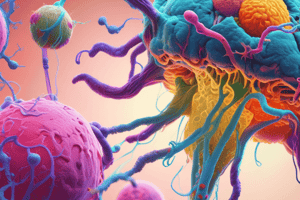Podcast
Questions and Answers
What is the primary function of lymph nodes?
What is the primary function of lymph nodes?
Trapping and destroying foreign substances, cancer cells, and germs
How do immune cells in lymph nodes support the immune system?
How do immune cells in lymph nodes support the immune system?
They help to activate lymphocytes, enabling them to recognize and fight infections.
Besides transporting immune cells and fluid, what role does lymph fluid play?
Besides transporting immune cells and fluid, what role does lymph fluid play?
Absorption of fat and fat-soluble vitamins from the digestive system
What is the function of the lymphatic system in relation to white blood cells?
What is the function of the lymphatic system in relation to white blood cells?
How does a well-functioning lymphatic system contribute to our health?
How does a well-functioning lymphatic system contribute to our health?
Why is understanding the lymphatic system's functions vital for promoting good health?
Why is understanding the lymphatic system's functions vital for promoting good health?
What is the function of lymph in the body?
What is the function of lymph in the body?
Which cells are central to the immune system and are found in the lymphatic system?
Which cells are central to the immune system and are found in the lymphatic system?
How does lymph fluid move through the body?
How does lymph fluid move through the body?
What is the role of lymph nodes in the immune system?
What is the role of lymph nodes in the immune system?
What type of cells are responsible for targeting specific pathogens in the immune system?
What type of cells are responsible for targeting specific pathogens in the immune system?
Why are lymph nodes strategically placed throughout the body?
Why are lymph nodes strategically placed throughout the body?
Flashcards are hidden until you start studying
Study Notes
Lymph: The Fluid That Propels the Immune System
The lymph is a colorless, fluid substance that flows throughout our bodies, forming a crucial network known as the lymphatic system. This system works closely with the immune system, helping to maintain fluid balance, defend against infections, and regulate the body's overall health.
Lymphocytes: The Fighters and Regulators
At the heart of the lymphatic system, you'll find lymphocytes. These cells, which include T cells, B cells, and natural killer cells, are central to the immune system's ability to recognize and respond to foreign substances. T cells and B cells are responsible for targeting specific pathogens, while natural killer cells defend against viruses and cancerous cells.
Lymph Circulation: A Diverse Journey
Unlike blood, which is pumped through vessels by the heart, lymph fluid moves through a network of lymph vessels with the help of muscle contractions and valves. Lymph vessels transport lymph fluid from tissues to the lymph nodes, where immune cells filter and eliminate pathogens. The lymphatic system also helps to return excess interstitial fluid from tissues back into the bloodstream, ensuring that body fluids remain balanced.
Lymph Nodes: The Filters of the Immune System
Lymph nodes are small, bean-shaped structures that contain immune cells. They are strategically placed throughout the body, from the neck to the groin and armpits. Lymph nodes act as filters, trapping and destroying foreign substances, cancer cells, and germs that enter the lymphatic system. The immune cells in lymph nodes also help to activate the lymphocytes, enabling them to recognize and fight infections.
Functions of Lymph: Beyond Transportation
Although lymph fluid is primarily known for transporting immune cells and fluid, it also plays a role in the absorption of fat and fat-soluble vitamins from the digestive system. The lymphatic system also carries white blood cells that have left the bloodstream after an infection, allowing them to reach lymph nodes and other immune cells.
The Lymphatic System: A Vital Part of Our Health
The lymphatic system is essential for maintaining our health, as it prevents swelling, regulates fluid balance, and supports the immune system. A well-functioning lymphatic system is part of a strong defense against infections and diseases.
Despite its critical role, the lymphatic system is often overlooked, with research and medical attention focused primarily on the circulatory system. However, understanding the lymphatic system's functions and interconnectedness with the immune system is vital for promoting good health and combating illness.
Studying That Suits You
Use AI to generate personalized quizzes and flashcards to suit your learning preferences.




